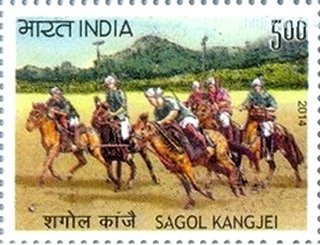
The Sahitya Akademi, India's National Academy of Letters, is an organisation dedicated to the promotion of literature in the languages of India. Founded on 12 March 1954, it is supported by, though independent of the Indian government. Its office is located in Rabindra Bhavan near Mandi House in Delhi.

The Third Amendment of the Constitution of India, officially known as The Constitution Act, 1954, re-enacted entry 33 of the Concurrent List in the Seventh Schedule of the Constitution with relation to include trade and commerce in, and the production, supply and distribution of 4 classes of essential commodities, foodstuffs, including edible oil seeds and oils; cattle fodder, including oilcakes and other concentrates; raw cotton whether ginned or unginned, and cotton seeds; and raw jute.

The Fifth Amendment of the Constitution of India, officially known as The Constitution Act, 1955, empowered the President to prescribe a time limit for a State Legislature to convey its views on proposed Central laws relating to the formation of new States and alteration of areas, boundaries or names of existing States. The amendment also permitted the President to extend the prescribed limit, and prohibited any such bill from being introduced in Parliament until after the expiry of the prescribed or extended period. The 5th Amendment re-enacted the provision to Article 3 of the Constitution.

The Eighth Amendment of the Constitution of India, officially known as The Constitution Act, 1959, amended article 334 of the Constitution in order to extend the period of reservation of seats for the Scheduled Castes and Scheduled Tribes and representation of the Anglo-Indians in the Lok Sabha and the State Legislative Assemblies for ten years, i.e. up to 26 January 1970. Article 334 had stipulated that the reservation of seats should expire within a period of ten years from the commencement of the Constitution.

The Twenty-third Amendment of the Constitution of India, officially known as The Constitution Act, 1969, discontinued reservation of seats for the Scheduled Tribes in Nagaland, both in the Lok Sabha and the State Legislative Assembly and stipulated that not more than one Anglo-Indian could be nominated by the Governor to any State Legislative Assembly. Prior to the amendment, the number of Anglo-Indians who could be nominated to the State Legislative Assemblies, was left to the discretion of the Governor of the State. The amendment also extended the period of reservation of seats for the Scheduled Castes and Scheduled Tribes and representation of the Anglo-Indians in the Lok Sabha and the State Legislative Assemblies for another ten years, i.e. up to 26 January 1980.

The Forty-fifth Amendment of the Constitution of India, officially known as The Constitution Act, 1980, extended the period of reservation of seats for the Scheduled Castes and Scheduled Tribes and representation of the Anglo-Indians in the Lok Sabha and the State Legislative Assemblies for another ten years, i.e. up to 26 January 1990.

The Ninety-fifth Amendment of the Constitution of India, officially known as The Constitution Act, 2009, extended the period of reservation of seats for the Scheduled Castes and Scheduled Tribes and representation of the Anglo-Indians in the Lok Sabha and the State Legislative Assemblies for another ten years, i.e. up to 26 January 2020.

The Sixty-second Amendment of the Constitution of India, officially known as The Constitution Act, 1989, extended the period of reservation of seats for the Scheduled Castes and Scheduled Tribes and representation of the Anglo-Indians in the Lok Sabha and the State Legislative Assemblies for another ten years, i.e. up to 26 January 2000.

The Seventy-ninth Amendment of the Constitution of India, officially known as The Constitution Act, 1999, extended the period of reservation of seats for the Scheduled Castes and Scheduled Tribes and representation of the Anglo-Indians in the Lok Sabha and the State Legislative Assemblies for another ten years, i.e. up to 26 January 2010.

The Twelfth Amendment of the Constitution of India, officially known as The Constitution Act, 1962, incorporated Goa, Daman and Diu as the eighth Union territory of India, by amending the First Schedule to the Constitution. India acquired control of Goa, Daman and Diu from Portugal in December 1961. The amendment also amended clause (1) of article 240 of the Constitution to include therein these territories in order to enable the President to "make regulations for the peace, progress and good government of the territory".

The Fourteenth Amendment of the Constitution of India, officially known as The Constitution Act, 1962, incorporated Pondicherry as the ninth Union territory of India, and also gave Parliament the authority to create by law, Legislatures and Councils of Ministers for the Union territories of Himachal Pradesh, Manipur, Tripura, Goa, Daman and Diu and Puducherry.

The Eighteenth Amendment of the Constitution of India, officially known as The Constitution Act, 1966, amended article 3 of the Constitution in order to clarify the "State" in clauses (a) to (e) of that article include "Union territories". It also added another "Explanation" that the power conferred on Parliament by clause (a) includes the power to form a new State or Union territory by uniting a part of any State or Union territory to any other State or Union territory.

The Twentieth Amendment of the Constitution of India, officially known as The Constitution Act, 1966, inserted a new article 233A inter alia validating the appointments, postings, promotions, and transfers of and judgements, delivered before the commencement of the present Act, by district judges who were appointed, posted, promoted or transferred as a district judge in any State otherwise than in accordance with the provisions of article 233 or article 235 of the Constitution.

The Twenty-first Amendment of the Constitution of India, officially known as The Constitution Act, 1967, amended the Eighth Schedule to the Constitution so as to include Sindhi as one of the languages, thereby raising the total number of languages listed in the schedule to fifteen. The Eighth Schedule lists languages that the Government of India has the responsibility to develop.

The Ninety-second Amendment of the Constitution of India, officially known as The Constitution Act, 2003, amended the Eighth Schedule to the Constitution so as to include Bodo, Dogri, Maithili and Santali languages, thereby raising the total number of languages listed in the schedule to 22. The Eighth Schedule lists languages that the Government of India has the responsibility to develop.

The Twenty-second Amendment of the Constitution of India, officially known as The Constitution Act, 1969, inserted new article 244A in the Constitution to empower Parliament to enact a law for constituting an autonomous State within the State of Assam and also to provide the autonomous State with Legislature or a Council of Ministers or both with such powers and functions as may be defined by that law.

The Twenty-fourth Amendment of the Constitution of India, officially known as The Constitution Act, 1971, enables Parliament to dilute Fundamental Rights through Amendments of the Constitution. It also amended article 368 to provide expressly that Parliament has power to amend any provision of the Constitution. The amendment further made it obligatory for the President to give his assent, when a Constitution Amendment Bill was presented to him.

The Eighth Schedule to the Constitution of India lists the official languages of the Republic of India. At the time when the Constitution was enacted, inclusion in this list meant that the language was entitled to representation on the Official Languages Commission, and that the language would be one of the bases that would be drawn upon to enrich Hindi and English, the official languages of the Union. The list has since, however, acquired further significance. The Government of India is now under an obligation to take measures for the development of these languages, such that "they grow rapidly in richness and become effective means of communicating modern knowledge." In addition, candidates sitting for an examination conducted for public service are entitled to use any of these languages as a medium to answer the paper.

The One Hundred and Fourth Amendment of the Constitution of India, extends the deadline for the cessation of the reservation of seats for members from Scheduled Castes and Scheduled Tribes in the Lok Sabha and State Legislative Assemblies by a period of 10 years.

The culture of Meitei civilization receives many honours and recognitions in the national level of the Republic of India, either from the Union Government of India or from any other national level associations and organizations. Notably, the Ministry of Culture (India) officially recognises diverse intangible cultural heritages of Meitei people.





